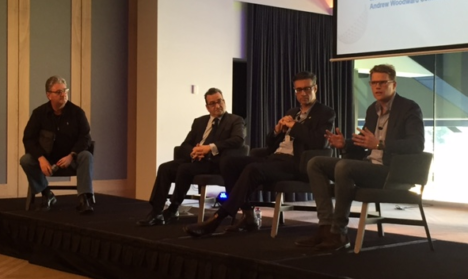Essendon sponsorship deals saved by ‘open and honest’ approach, says CMO
Essendon Football Club retained its sponsors, and even struck one multi-million dollar deal, despite being immersed in one of the country’s biggest sporting scandals and facing the “biggest brand challenge in Australian sporting history”.
Chief marketing officer of the embattled club, Justin Rodski, said Essendon held on to its sponsors by being “upfront, open and honest” about its travails.

From left: moderator Andrew Woodward; Maxus CEO Mark McCraith; Australian Rugby Union head of partnerships Pete Scibberas; and Essendon Football Club CMO Justin Rodski
Speaking at the Mumbrella Sports Marketing Summit in Sydney, Rodski admitted the AFL club was still fighting to salvage its reputation, a process that could take “years”.

